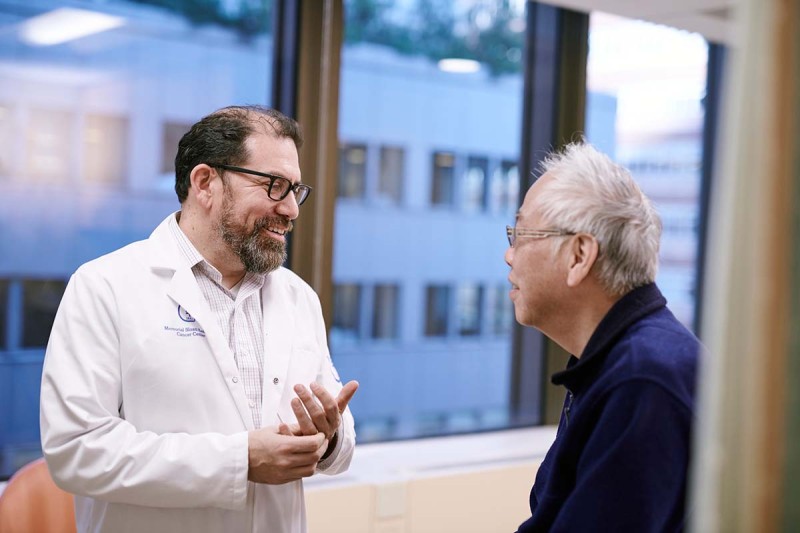
MSK oncologists (cancer doctors) are experts in chemotherapy for pancreatic cancer. Chemotherapy (chemo) is a treatment that uses strong drugs to kill cancer cells, or stop or slow their growth.
Pancreatic cancer chemotherapy drugs
- Chemotherapy drugs are carried throughout your body to kill cancer cells wherever they are. Chemo drugs for pancreatic cancer include:
- FOLFIRINOX (a combination of 5-fluorouracil, oxaliplatin, irinotecan, and leucovorin)
- Gemcitabine, nab-paclitaxel
- NALIRIFOX (a combination of liposomal irinotecan, 5-fluorouracil, oxaliplatin, leucovorin). This treatment has approval pending from the U.S. Food and Drug Administration.
When do you have chemotherapy for pancreatic cancer?
Chemotherapy can help people with pancreatic cancer live longer and keep their quality of life.
Chemotherapy is:
- Combined with surgery or radiation therapy for tumors that are only in the pancreas.
- A primary treatment for inoperable tumors that are only in the pancreas. Inoperable means the tumor cannot be operated on.
- For pancreatic tumors that have spread from the pancreas to other areas.
Chemotherapy before surgery is called neoadjuvant (NEE-oh-A-joo-vant) chemotherapy. It’s recommended for some people with pancreatic cancer that can be treated with surgery.
MSK is researching whether chemo before surgery can help shrink advanced tumors so they can be removed more easily.
Side effects of pancreatic cancer chemotherapy
Chemotherapy drugs have fewer side effects than in the past. There also have been many improvements in supportive care to help with any side effects.
Common side effects of chemotherapy include:
- Fatigue (feeling very tired)
- Thinning hair
- Low blood counts
- Nausea (feeling like throwing up)
- Diarrhea (loose, watery poop)
- Neuropathy (tingling or numbness in the fingers and toes)
How is chemotherapy for pancreatic cancer given?
Chemotherapy is a drug or a combination of drugs we give by vein (intravenously) or by mouth (orally).
Targeted therapy for pancreatic cancer
Some people with pancreatic cancer have changes (mutations or variants) in the genes they inherited (were born with).
MSK offers the latest tests to get information about a tumor’s genetic changes. Tumor genetic profiling tests, such as liquid biopsies, show whether cancer is caused by genetic changes.
We can then choose a treatment that targets those molecular changes. Targeted therapies only target cancer cells and match the exact kind of pancreatic cancer tumor you have.
Examples of such genes include the BRCA1/2 genes of Lynch genes. These tumors may be treated with the drug olaparib or immunotherapy.
Some gene changes in pancreatic cancer tumors are rarer. They include NRG1, NTRK, ROS, BRAF, and ALK. They can be treated with other targeted therapies.
What are some of the advancements in pancreatic cancer chemotherapy?
MSK is a leader in developing new treatments for pancreatic cancer. You may be able to join our research studies, also known as clinical trials.
We’re researching new chemotherapy drugs, targeted therapies, immune therapies, and drug combinations. Many of these treatments are not available at most other hospitals. You can search for a clinical trial or talk with your care team.



